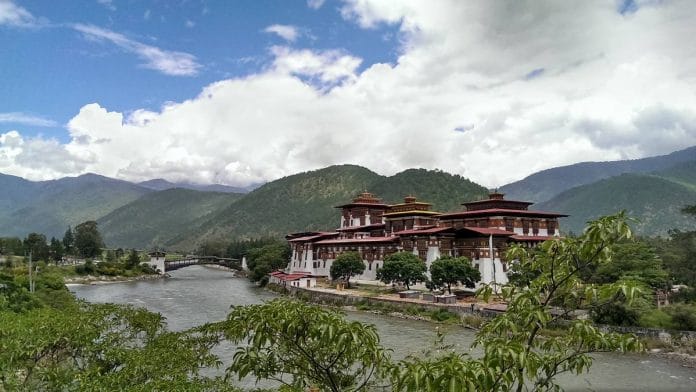During my stay, there were many discussions about the various ways in which Bhutan might increase its own foreign revenues without selling out to the standard capitalist-consumerist model, which the King of Bhutan was determined not to allow to contaminate the minds of his subjects. (Television had been banned until 1999 for the same reason.)
I have to admit that I felt some nostalgic sympathy for this approach, troubling though many Western commentators found it. Almost as soon as I arrived in this remarkably unspoiled country, I had a sense that it was in the process of being contaminated before my very eyes, mainly by the presence of the Western aid cohorts and their generally good intentions. The United Nations, which was prominent in Bhutan, appeared to be unconsciously spreading the virus of consumerism as the conquistadors had spread smallpox in the Americas. Their mean-looking Land Cruisers with knobbly tires and long whippy aerials tearing about the country, the mobile phones which they generously distributed to their local staff so everybody could stay constantly in touch, and which those staff then took back home and showed off to their admiring friends and families: it all looked like the beginning of the contagion. Not that I’d wish to deprive anyone in Bhutan of the advantages of modern technology or wealth, of course, and I was aware of a contradiction here which I have never fully resolved. A few years later, I was to argue for a deliberate release of the same virus in Afghanistan, since it felt like the most potent, most readily available, and least harmful antidote to the ignorance, poverty, darkness, and oppression that had reigned there, on and off, since the Middle Ages.
If Bhutan can make the transition to whatever degree of benign modernity it desires without losing too much of the social, cultural, spiritual, environmental, and human wealth it still possesses, that would be of value to us all.
Also read: An Indian-Chinese couple went on a road trip to Chengdu — this is what they found
This was a country that produced very little, so it didn’t have many choices when planning export strategies. It was a country that, in fact, depended on stamp collectors for a not insignificant part of its foreign revenues. They say that philately gets you nowhere, but money earned from the sale of Bhutanese postage stamps has been a mainstay of the economy since the 1960s, thanks to the efforts of one Burt Todd, an American from Pittsburgh, who created and ran the country’s highly successful and innovative Stamp Agency for many years and was responsible, among many other marvels, for a limited edition of musical postage stamps that could actually be played on a gramophone. (Now there’s a story that’s begging to be made into a movie.)
The minister of tourism explained to me that the kingdom would like to welcome more tourists to the country, but it could only be small numbers of wealthy tourists who trod carefully, respected the culture, spent decent amounts of money, and left no traces behind. They simply didn’t have the infrastructure for mass tourism, and what they knew of UK package holiday-makers in Spain or US spring breakers in Mexico made them fearful for the fragile fabric of their homeland.
The minister told me that they’d asked a European marketing consultant how they could best target these high-level visitors. He recommended a highly targeted global advertising campaign to run in the exclusive magazines that only such people read. It seemed like a sensible plan, except that unfortunately the cost of the campaign was around 1 percent of the country’s GDP, and did I have any slightly more affordable ideas?
Also read: India ‘talking’ to Bhutan as Beijing opens new front with Thimphu along Arunachal border
A little reverse psychology suggested that they could earn money from this problem rather than spending it. Instead of begging rich people to visit Bhutan, it would be far better to tell them they couldn’t visit even if they wanted to. (If I know one thing about spoiled rich people, it’s that they absolutely cannot resist things they’re not allowed to have.) I suggested setting a stiff daily penalty for any foreigners wishing to contaminate the precious soil of Druk Yul with their western boots, perhaps on the order of a thousand dollars per day. The exact amount could be carefully calibrated in order to warn off the precise socioeconomic target they wished to attract.
Tourist taxes had been used before and in several countries had proved an effective way of offsetting the harm done by the tourist industry. But the idea of making the charge deliberately and explicitly punitive seemed more powerful, and although the amount of the charge as well as the language used to describe it was de-escalated before implementation, the income it has generated has helped Bhutan to become one of the most environmentally sustainable economies in the world. At the same time, it has grown its tourism business at the modest rate it wanted, as well as making a statement of self-worth which many thousands of visitors continue to find not merely acceptable but irresistible. And every time somebody complains online about the charge (now a mere $250, to include accommodation), they are sending out a clear signal to anyone who takes pride in not being someone that scrimps and saves, that this is the destination for them. The skinflints continue to do Bhutan’s tourism marketing on its behalf, and the environment reaps the benefit.
Bhutan’s concept of Gross National Happiness is of course the best-known example of its influence on the world. My view is that the idea of happiness as a measure of social progress is probably a necessary step toward a world that works, but only a preliminary one. Being more happy won’t head off climate change, halt a pandemic, or reduce inequality, even if “how happy can I be” is a good deal more productive for humanity than “how rich can I be.” Where we need to get to is “how happy can we be,” which is in fact rather closer to the original Buddhist conception behind it. It’s a collective rather than individual notion of fulfilment, but this subtlety has largely been lost on Western audiences, for whom subjective feelings of happiness probably have more to do with the number of electronic devices they own than the serenity they share with their community.
 This excerpt from The Good Country Equation by Simon Anholt has been published with permission from Berrett-Koehler Publishers, Inc.
This excerpt from The Good Country Equation by Simon Anholt has been published with permission from Berrett-Koehler Publishers, Inc.







Media of all types create this blitz unnecessarily for itself by hyping up or sexing up half truths for power politics n money.
I worked in Bhutan in 1983 until 1November. I know for a fact that we had TV fully in use among elite Bhutanese, and of course among the international community from the UN as well as the diplomatic missions.
Nice article
How many covid cases in bhutan right now ?
245 positives cases,161 recovered and no fatality.